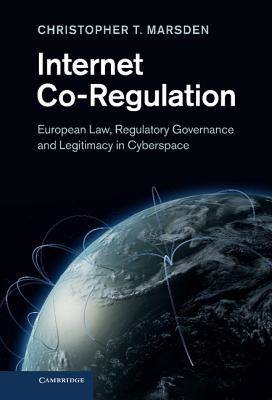
- Afhalen na 1 uur in een winkel met voorraad
- Gratis thuislevering in België vanaf € 30
- Ruim aanbod met 7 miljoen producten
- Afhalen na 1 uur in een winkel met voorraad
- Gratis thuislevering in België vanaf € 30
- Ruim aanbod met 7 miljoen producten
Zoeken
Internet Co-Regulation
European Law, Regulatory Governance and Legitimacy in Cyberspace
Christopher T Marsden
Hardcover | Engels
€ 136,95
+ 273 punten
Omschrijving
Chris Marsden argues that co-regulation is the defining feature of the Internet in Europe. Co-regulation offers the state a route back into questions of legitimacy, governance and human rights, thereby opening up more interesting conversations than a static no-regulation versus state regulation binary choice. The basis for the argument is empirical investigation, based on a multi-year, European Commission-funded study and is further reinforced by the direction of travel in European and English law and policy, including the Digital Economy Act 2010. He places Internet regulation within the regulatory mainstream, as an advanced technocratic form of self- and co-regulation which requires governance reform to address a growing constitutional legitimacy gap. The literature review, case studies and analysis shed a welcome light on policymaking at the centre of Internet regulation in Brussels, London and Washington, revealing the extent to which states, firms and, increasingly, citizens are developing a new type of regulatory bargain.
Specificaties
Betrokkenen
- Auteur(s):
- Uitgeverij:
Inhoud
- Aantal bladzijden:
- 310
- Taal:
- Engels
Eigenschappen
- Productcode (EAN):
- 9781107003484
- Verschijningsdatum:
- 17/10/2011
- Uitvoering:
- Hardcover
- Formaat:
- Genaaid
- Afmetingen:
- 155 mm x 231 mm
- Gewicht:
- 589 g

Alleen bij Standaard Boekhandel
+ 273 punten op je klantenkaart van Standaard Boekhandel
Beoordelingen
We publiceren alleen reviews die voldoen aan de voorwaarden voor reviews. Bekijk onze voorwaarden voor reviews.











